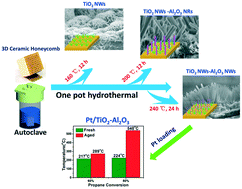Robust and well-controlled TiO2–Al2O3 binary nanoarray-integrated ceramic honeycomb for efficient propane combustion
Abstract
The catalytic total oxidation of short-chain alkanes released from automobile exhausts is still a big challenge in volatile organic compound (VOC) elimination. The significant degradation of catalytic activity after hydrothermal aging is a widely existing issue. Herein, we report a facile one-pot hydrothermal method to successfully grow TiO2–Al2O3 binary nanoarrays on the 3D channel surfaces of ceramic honeycombs. Such a binary nanoarray was heterogeneously integrated on the cordierite honeycomb channel surface with closely separated nanowire arrays of anatase-TiO2 and mesoporous γ-Al2O3, which exhibited excellent robustness under mechanical vibration and thermal and hydrothermal aging. Moreover, propane conversion with the Pt/TiO2–Al2O3 binary nanoarray catalyst rapidly reached 80% at a temperature as low as 224 °C, suggesting that the binary nanoarray catalyst is a promising candidate for practical applications.



 Please wait while we load your content...
Please wait while we load your content...
